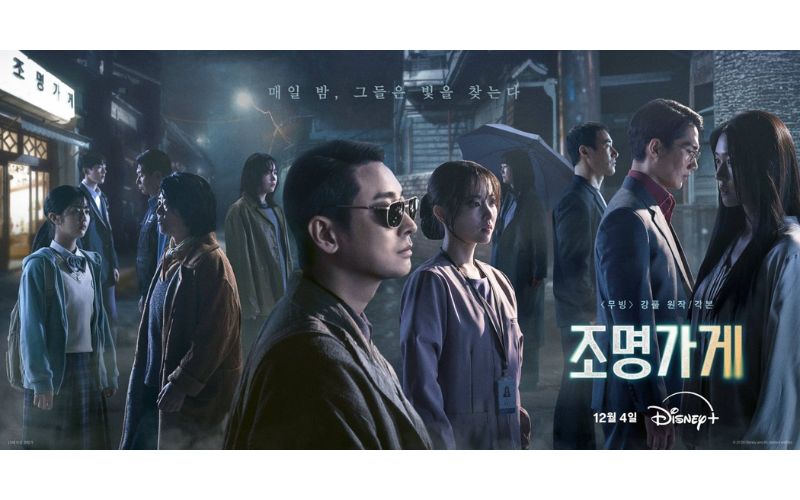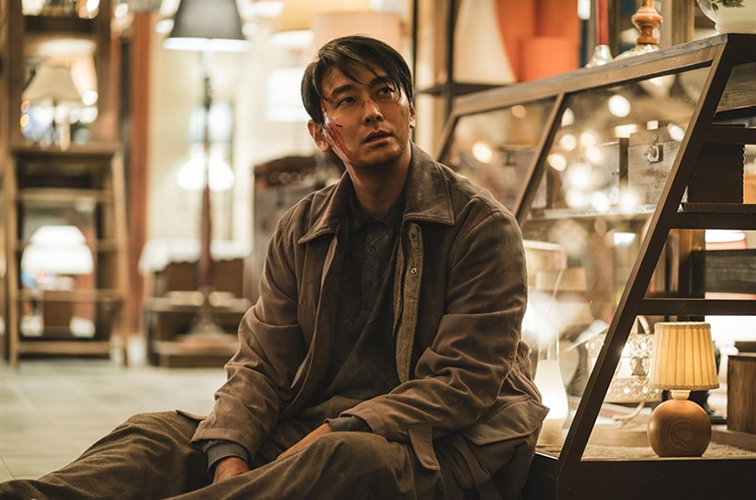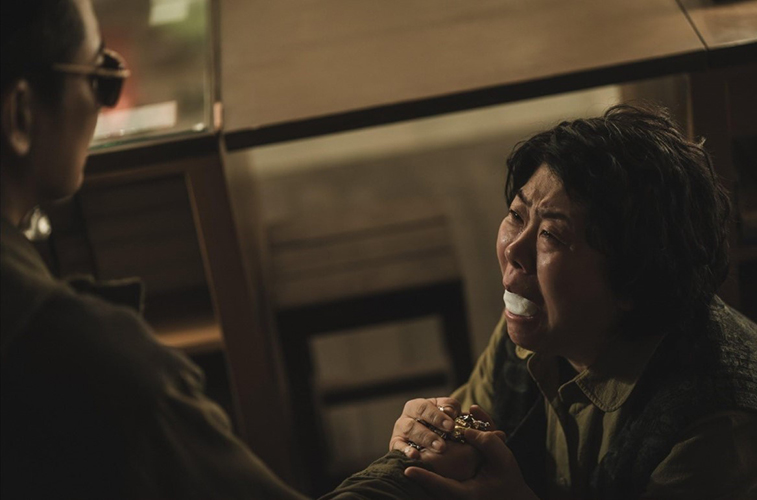The subject of life and death is one of the most important themes that has always drawn the attention of artists in various fields, and cinema is no exception. Over the years, many films and series have been produced with this theme, each approaching it from the perspective of their writers and creators. Among them, the series “Light Shop” offers one of the most distinct portrayals of life and death. Its narrative engages the audience deeply and pulls them into its unique story and taking them through its darkest and brightest depths.
“Light Shop” is a psychological/mystery fantasy Korean series with horror elements, written by Kang Full, marking actor Kim Hee-won’s directorial debut, starring Ju Ji-hoon, Park Bo-young, Lee Jung-eun, Bae Seong-woo, Kim Min-ha, Uhm Tae-goo, Kim Seol-hyun, Shin Eun-soo, Park Hyuk-kwon, Kim Sun-hwa, Kim Dae-myung, and Kim Ki-hae. According to Disney+,“Light Shop”, based on the webtoon of the same name by Kang Full, became the biggest Korean original premiere of 2024, and ranks as the second-largest Korean series debut ever on the platform globally.

The story of “Light Shop” takes place on the border between life and death—a boundary guarded by Jung Won-young (Ju Ji-hoon), the owner of a light shop, and Kwon Young-ji (Park Bo-young), an ICU nurse. In the dark alleys that seem to have no end, and in a night that refuses to end, there is a light shop whose glow draws wandering strangers toward itself. Each of these strangers carries a story from their past, and now, in search of answers to their questions and a future that awaits them, though they know nothing of it yet, they turn to the light shop owner. Behind his sunglasses, he sees their truths and understands exactly what they are looking for.
“Light Shop” is a mysterious narrative filled with inner struggles between life and death. A fusion of contrasts: light and darkness, the seen and the hidden, life and death, each emerging from the heart of the other, defining it. The series is a curious attempt to understand these concepts and find answers to the questions that constantly occupy our minds. “Light Shop”, by delving into human relationships and deep emotions such as grief, joy, and regret, even while centering the theme of death, portrays a vision of life across two different worlds.
“Light Shop” is a collection of independent stories, each forming a part of a single whole: a young woman with a suitcase at a bus stop waiting for someone she knows; a high-school girl who visits the light shop every night to buy a bulb for her mother; a man who, each night, is awakened by a dog’s bark and, in searching for it, ends up at the light shop; a detective wandering through dark alleys in pursuit of a motorcycle-riding criminal; a young woman writer who has just moved into a new house where strange events begin to unfold; a bus driver who, wet and in tears, searches desperately for someone; and a student who enters an eerily dark alley at night but is unable to reach its end.

These narratives share the same theme and follow a common path of meaning, ultimately leading their characters to a single place: the light shop. Each story describes a situation that drives the characters into action and has a decisive impact on them. In other words, it is these very situations that play the main role in the screenplay. For this reason and contrary to the conventional structure of screenplays that begin with introducing the characters, “Light Shop” opens by depicting these situations.
Although the slow rhythm in the first half of the series may affect the audience’s eagerness to follow it, the use of close-up and POV shots places the viewer within the emotional space of the characters, drawing them into their stories and questions. In this way, the viewer is elevated from a mere spectator to an observer, someone who experiences the world of the work from within and sees themselves present in it. However, the ambiguity surrounding the young woman waiting at the bus stop and her story, (featuring Kim Seol-hyun and Uhm Tae-goo), is still not solved. While this adds to the overall mysterious tone of the narrative and allows for personal interpretation by the audience, it may leave some viewers with a sense of confusion.
In “Light Shop”, where the dialogues are sparse but meaningful, the main burden of conveying the message and emotions rests on the actors, all of whom deliver notable performances. Their performances, alongside the lighting and special effects, play a pivotal role in advancing the story. Amidst this, the leadership of director Kim Hee-won, with his strong acting background, is clearly evident.

Ju Ji-hoon’s performance as Jung Won-young, the light shop owner, is outstanding, once again demonstrating his talent for portraying complex roles. The character Jung Won-young has a unique trait: his eyes are hidden behind sunglasses for almost the entire series. This poses a formidable challenge for an actor, as he is effectively deprived of one of the most important means of connecting with the audience. However, Ju Ji-hoon has successfully overcome this challenge. By using his voice, facial expressions, and body language to convey emotions and connect effectively with the audience, he turns in one of his most memorable performances. Moreover, his emotional and strong performance in the flashback sequence to the past, when he first enters the light shop to save his young daughter, creates one of the most impactful scenes of the series. Another remarkable scene is the reunion of Jung Yu-hee (Lee Jung-eun) with her father, Jung Won-young, after 50 years. Ju Ji-hoon and Lee Jung-eun deliver a powerful interaction in this scene. Their expressions, movements, and emotional nuance, without words, make the moment profoundly moving. These two scenes provide the audience with a unique portrayal of both grief and joy that lingers in the mind.
How about this article?
- Like2
- Support1
- Amazing0
- Sad0
- Curious0
- Insightful0


